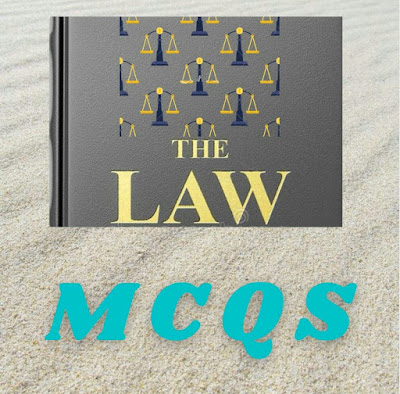T. Y B. COM
SEMESTER - 6
BUSINESS LAW - II
MCQS = JAN - 2011
(1) Which one the following Negotiable Instrument can be crossed'?
(a) Cheque
(b) Bill of exchange
(c) Promissory note
(d) All of these
(2) In which of the following negotiable instrument protest is not required in case of its dishonor?
(a) promissory note
(b) cheque
(c) Bill of exchange
(d) both (a) & (b)
(3) Which of the following is a negotiable instrument by statute?
(a) Railway receipt
(b) Bank draft
(c) debentures
(d) promissory note
(4) Which of the following can make or issue a promissory note payable to the bearer on demand?
(a) State Bank of India
(b) Reserve Bank of India
(c) Central Bank of India
(d) Bank of India
(5) Which of the following is not an essential feature of bill of exchange?
(a) Two parties
(b) Writing
(c) Stamping
(d) Order to pay
(6) Which of the following is/are the characteristics of a cheque?
(a) Three parties
(b) Drawn upon a specified banker
(c) Stamping
(d) Both (a) and (b)
(7) The maker of the bill is also known as .............
(a) drawee
(b) acceptor
(c) payee
(d) drawer
(8) The drawee when accepts the bills is also known as .......
(a) drawer
(b) assignee
(c) acceptor
(d) payee
(9) Which of the following Negotiable Instrument required acceptance?
(a) a cheque
(b) a promissory note
(c) a bill of exchange
(d) all of these
(10) lf the words "and company" are written between two parallel transverse lines of cheque, such crossing is known as
(a) general crossing
(b) restrictive crossing
(c) Special crossing
(d) All of these
(11) A cheque which is payable across the counter of the bank is called as:
(a) open cheque
(b) closed cheque
(c) crossed cheque
(d) none of these
(12) In which of the following Negotiable Instruments grace period is allowed?
(a) cheque
(b) promissory note
(c) bank note
(d) bill of exchange
(13) in which of the following negotiable instrument the payment may be countermanded by the drawer?
(a) Promissory note
(b) cheque
(c) Bill of exchange
(d) Both (a) and (b)
(14) All cheques are ...........
(a) promissory note
(b) bills of exchange
(c) Both (a) & (b)
(d) none of these






No comments:
Post a Comment